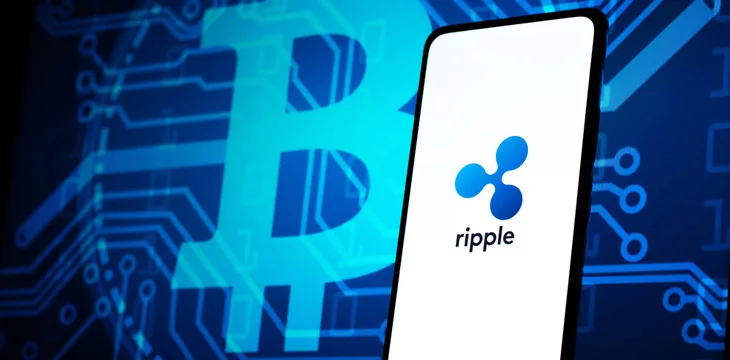|
Getting your Trinity Audio player ready...
|
District Judge Analisa Torres has rejected the U.S. Securities and Exchange Commission’s (SEC) interlocutory appeal request against a partial ruling in its case against digital asset firm Ripple Labs, stating that the regulator did not meet its burden to show “substantial ground for difference of opinion.”
In an October 3 court order, Judge Torres denied the SEC’s motion, claiming that the regulator also failed to meet its burden to show that there were controlling questions of law or that an appeal would materially advance the ultimate termination of the case.
The SEC is suing Ripple Labs, along with CEO Brad Garlinghouse and Executive Chairman Christian Larsen, for engaging in illegal securities offerings from 2013 up to the present, based on the sale of digital assets XRP.
In July, Judge Torres ruled on two summary judgment motions—requests for rulings on specific aspects of a case submitted before the final judgment—from both parties, deciding that institutional sales of XRP amounted to illegal securities based on the Howey test, but that “programmatic sales” of XRP through exchanges and algorithms did not, due to the lack of “a reasonable expectation of profits to be derived from the entrepreneurial or managerial efforts of others.”
The SEC was appealing the latter part of this ruling. The regulator sought an ‘interlocutory’ appeal because parts of the case are ongoing, namely a trial by jury for Garlinghouse and Larsen over whether they are liable for aiding and abetting illegal securities sales to institutional investors who bought XRP.
In her court order denying the SEC’s appeal, Judge Torres reaffirmed her previous ruling, “based on the totality of circumstances, that an objective, reasonable Programmatic Buyer was not led to expect profits from the efforts of Ripple.”
She also refuted the comparison the SEC had attempted to make with a ruling in another case; SEC v Do Kwon and Terraform Labs, where the Judge expressly disagreed with the reasoning used to absolve Ripple of programmatic sales.
Torres stated that in the Terraform case, the court “accepted as true that the defendants embarked on a public campaign to encourage both retail and institutional investors to buy their crypto-assets by touting the profitability of the crypto-assets and the managerial and technical skills that would allow the defendants to maximize returns on the investors’ coins.”
This means that programmatic buyers would have a reasonable expectation of profits—one of the main factors in the Howey Test determining whether an asset sale can be classified as a security.
This was not the case, said Torres, with the programmatic sale of XRP by Ripple, where “Programmatic Buyers did not have every bit as good a reason [as the Institutional Buyers] to believe that [Defendants] would take their capital contributions and use [the capital] to generate profits on their behalf.”
As well as ruling on the SEC’s interlocutory appeal request, on Tuesday, Judge Torres set a trial date for April 23, 2024, for these remaining matters, with Ripple and the SEC expected to submit pretrial filings by the end of the year.
The long and winding road
The case goes back to December 22, 2020, when the SEC filed a complaint against Ripple Labs and its founders, accusing them of selling over 14.6 billion units of XRP without registering their offers and sales with the SEC.
In July 2022, Judge Torres ruled on the summary judgment orders, finding that institutional sales of XRP were illegal securities offerings, but programmatic sales were not. In an August 4 letter to Judge Torres, the SEC indicated that it intended to appeal the latter part of this ruling.
A few days later, on August 9, the SEC wrote to the court to argue that they should be allowed to make arguments on whether or not they can appeal the programmatic sale ruling. In response, two letters filed with a federal judge on August 16 by Ripple Labs and the other defendants opposed the regulator’s impeding appeal motion.
However, Judge Torres sided with the SEC and, on August 17, granted the regulator’s request and set several deadlines for the court to hear the argument on whether or not an appeal should be permitted.
The SEC filed its formal motion for leave to appeal on August 18. Ripple had until September 1 to respond, which they duly did, and the SEC’s final reply came on September 8.
On October 3, Judge Torres ruled on the matter, denying the SEC’s motion for an interlocutory appeal.
Interlocutory appeals are designed to address specific legal issues or rulings before the trial is completed. If an interlocutory appeal is denied, the party who was denied generally cannot appeal the same issue again at the end of the full trial, barring a change in legal precedent, new evidence, or procedural error.
This means that the issue of whether retail, “programmatic,” sales of XRP can be considered securities sales is most likely settled, the answer for Judge Torres being that they are not.
Follow CoinGeek’s Crypto Crime Cartel series, which delves into the stream of group—from BitMEX to Binance, Bitcoin.com, Blockstream, ShapeShift, Coinbase, Ripple,
Ethereum, FTX and Tether—who have co-opted the digital asset revolution and turned the industry into a minefield for naïve (and even experienced) players in the market.

 02-14-2026
02-14-2026 




